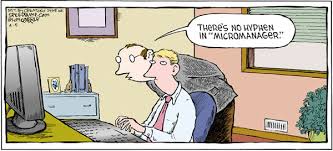Ever been in a situation where somebody says, I trust you to do the work, but then when you turn around, you notice your manager looking over your shoulder? The corporate world is replete with micromanagers. Sadly, many organizations prefer these managers because they seem to be in control. While they may produce results in the short-term, in the long-run, they leave a trail of destruction in their path.
The research is clear: According to the Harvard Business Review, micromanagement can be a costly style as it leads to decreased productivity and innovation, reduced morale and trust, as well as high staff turnover. Steve Jobs was also aligned with that thinking when he said, “It doesn't make sense to hire smart people and then tell them what to do. We hire smart people so they can tell us what to do.”
Here Is Why Micromanaging Is Ineffective:
People require autonomy over their work. After all, liberty and freedom are enshrined in our American values and should therefore extend to the workplace. Bestselling author Daniel Pink would argue that people are most satisfied when they are challenged and in control of four aspects of their job – task (what people do), time (when they do it), technique (how they do it), and team (who they do it with).
Something as simple as giving employees the autonomy to determine their own schedule can make a huge difference and provide a much-needed morale boost. The Stanford Economic Department showed productivity results rising a whopping 12.5% when people could work from home. Additionally, people took fewer sick days and were 50% less likely to quit. The simple fact is that the dreaded 9-5 schedule created under the Industrial Revolution era is quickly becoming obsolete in the knowledge economy.
We are born with biologically-based differences that dictate how well we thrive in different circumstances. For most people, peak performance is high in the morning, dips in the afternoon, and recovers in the early evening. Meanwhile, there are those who churn out their most masterful work at night, while the rest of the world sleeps. In Daniel Pink’s book, When: The Scientific Secrets of Perfect Timing, he lays out a treasure trove of data that shows how your cognitive abilities change throughout the day. The implication is that accommodations should be made for people depending on when they work best. For example, if they are craving a mid-afternoon run because it would add a burst of energy to their day, then why shouldn’t that need be obliged?
Why Else Might Micromanaging Be So Pervasive And What Can We Do About It?
1. It could be a breakdown in the fundamentals of delegation. Sometimes there is a lack of clarity in explaining the nature of the work to be done and why it should be done. There could be different ideas on what an outcome can look like. This can be addressed by making sure there is 2-way communication, so the targets to achieve are clear from the outset. Showing an example of success and the metric to measure it can go a long way.
2. Managers may be inexperienced in how to employ best practices. Moving from an individual contributor to a manager is an often-neglected transition, which does not allow them to get the necessary training. Having first-time manager training programs can help with this issue.
3. Some managers may never have had an example to follow. People usually learn how to lead from their previous bosses so they could just be emulating their styles. Having the opportunity to apprentice with a model manager or even collaborate with a great leader on projects so they can explain how they do things and why they do it would be a significant learning opportunity.
4. A great management tool called ROWE (results-oriented work environment) co-created by Jody Thompson and Cali Ressler offers a fantastic solution. It states that employees are paid for results (output) rather than the number of hours worked. It does not matter when people show up, it is more about getting the job done.
Being a good manager does not mean controlling every aspect of the work cycle. It takes great power in giving your team members latitude to make exciting discoveries that will have a more significant and long-lasting impact on you and your organization.
Thought of the day: “A leader is best when people barely know they exist when their work is done, their aim fulfilled, they will say: we did it ourselves.” -Lao Tzu, Daoist Founder
Q: In what areas of your work would you like your managers to grant you autonomy? Comment and share with us, we would love to hear your thoughts!
As a leadership development and executive coach, I work with leaders to develop their excellence, contact me to explore this topic further.
As a leader, how do you ensure you don’t micromanage?

